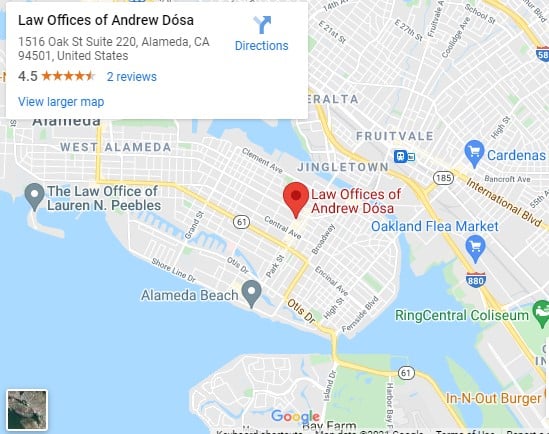What is The Criminal Court Process in California?
No matter how you watch it on TV repeatedly, understand that the criminal court process can be complex. Law and courthouses have their own rules that the average person might not be able to understand. This is why when you are an accused person being tried for a criminal case in California, it is best to get in touch with a criminal defense lawyer who can explain to you what going to trial is like to give you a better grasp of the criminal court process in California according to the California Penal Code.
You must first be familiar with the events leading up to the trials. First is the arrest made against you for the crime you have committed. The case begins upon filing a report and charges. This is soon followed by the arraignment and the trial. All of this can already seem too much for someone already going through their turmoils given their recent actions and thinking about how this will look on their criminal record, which is reason enough to enlist the help of a criminal law attorney from California.
Going to Trial in Alameda, CA
Being an accused person and going to trial in the superior court or the district court can be a confusing time, mentally and emotionally, for all those involved. If you’ve never even been to a courtroom before, know that you have the right to an attorney who will represent you. Contact an attorney from the Alameda, CA, law firm, The Law Offices of Andrew Dosa. A lawyer will be your greatest advocate in California court and your partner in helping get the best sentence for your case. They will not stop until you understand every step involved, providing you with legal advice given their years of knowledge.
Talk to an attorney from The Law Offices of Andrew Dosa now! The firm’s criminal defense lawyer is committed to helping you understand the legal system and obtain needed knowledge about the criminal procedure as your case progresses. With over two decades in practice areas such as civil litigation, business litigation, and criminal defense, there is no doubt this attorney can help you with this case. Schedule an appointment with The Law Offices of Andrew Dosa today!
Why Do I Need a Criminal Defense Attorney When Going to Trial in California?
The criminal court process in California is quite a puzzle for many to understand, especially if you have no experience in handling legal matters. There are plenty of things that are new to you that could only add confusion to your situation. If you are dealing with this, don’t deal with it alone. Know that even as a defendant, you have the right to an attorney. A criminal defense attorney from Alameda, CA, will help you with the criminal court process in California.
Being accused of a crime, be it a misdemeanor or a felony case, can make it difficult for you to know where to start, but understand that getting a California criminal defense attorney is one of the best steps you can take before going to a criminal trial.
With over 20 years of legal service, The Law Offices of Andrew Dosa are always fully equipped with the knowledge and experience you need when facing charges, including:
- Crafting strong defenses. Be it under the influence or an insanity defense, an attorney can justify it for you. With a thorough review of your case, an attorney can help you get a lesser sentence.
- An attorney can help you understand your rights even as a defendant.
- If you are preparing to go to a hearing for your crimes, a lawyer can help you prepare for trial by exploring your legal options and finding the best course of action.
- A lawyer knows that it’s not always about fighting in the legal world. Negotiations and mediations can be done to achieve the desired outcome.
If you’re looking for someone to help you as you weather this legal storm, look no further than The Law Offices of Andrew Dosa. The firm’s attorney can help you settle disputes, defend your rights, protect your integrity, and get the desired outcome you deserve. Servicing the Alameda County area, the lawyer provides free consultation to those who need it the most. Schedule an appointment right now!
What is The Criminal Court Process in California?
One of the most common queries before getting into a trial is how does the trial system work? What goes on inside a courthouse? What happens when someone commits a crime? These are some of the few things people wonder about when hearing about a trial, but what is the criminal court process in California?
The California criminal court process can be quite a lot for some to absorb. So if you are facing criminal charges in Alameda, CA, the wisest decision you can make is to get in touch with a criminal defense lawyer from The Law Office of Andrew Dosa.
What Happens When One Goes to Trial?
There are many factors involved when going on trial. A criminal case has many steps, including arrest, the start of the case, arraignment, after the arraignment, trial, and the verdict.
Arrest
Upon arrest, the police take the defendant to jail. What happens is the defendant is either:
- Released if the prosecutor decides not to file charges.
- The defendant posts bail or bond and is released based on a promise to appear in court on a given date.
- The defendant remains in jail.
The Start of the Case
The case starts when the police arrest the defendant and write a report. That serves as an overview of the events leading up to the arrests with citations of information relevant to the case. Defendants do not have the right to a copy of their arrest report, but their lawyers do to help review the case. After this, the prosecutor decides whether to file charges. Defendants have the right to a speedy trial, so the prosecutor must file within 48 hours of the arrest.
The Arraignment
The arraignment is the first time the criminal defendant appears in court, just like a preliminary hearing. The difference compared to the preliminary hearing is when the judge decides there’s enough evidence against you to stand trial. The judge then relays to the defendant their charges and rights. The court will appoint a lawyer for free if they don’t have enough money. The defendant can also respond by entering a plea, such as guilty, not guilty, or no contest.
Trial
Defendants in criminal cases have the right for the jury to decide whether or not they are guilty or innocent. They need to decide whether to have a jury or court trial. Defendants choose a jury trial since they wish for peers to hear evidence and determine their fate. Most accused of a crime are presumed to be innocent until proven guilty. The prosecutor’s job is to convince the jury that the defendant is guilty indeed.
What Happens at a Trial?
The right to a jury trial in most criminal cases is guaranteed by the Sixth Amendment of the US Constitution and the laws of every state. Jury procedures vary depending on the court hearing the case, though most trials begin with jury selections. Afterward, both the prosecutor and defense attorneys give a preview of the evidence.
After the opening statements, the prosecution presents evidence of the crime. This is countered by the defense as a means for each side to cross-examine the evidence. The judge will then instruct the jury on laws applicable to the case, which will result in them deliberating whether the defendant is guilty or not guilty. The district attorney or prosecutor can either dismiss or enter a plea bargain if the jury is hung.
Call our Criminal Defense Attorney in Alameda, CA, Now!
Getting a lesser sentence might be the goal if you’re facing criminal charges but know that there’s an entire criminal process involved that you must first go through before reaching your goal. Getting in touch with an attorney from The Law Office of Andrew Dosa is the first step you must take. Aside from defending you, an attorney can also explain what happens to you when going to trial in California. Even if you are the defendant, know that you still have your rights. Schedule an appointment immediately!


